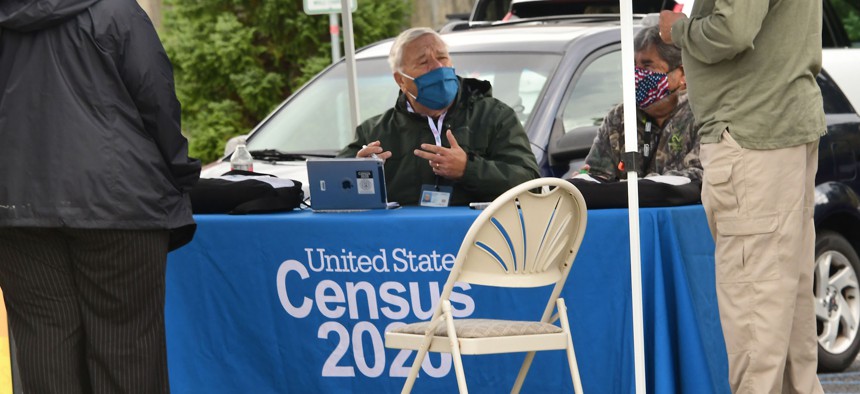
People working for the Census Bureau hold an event to get people to complete their 2020 census forms on Oct. 2, 2020, in Albany, N.Y. One expert said that there's been "radio silence" from the Trump administration about 2030 census preparations. Lori Van Buren / Albany Times Union / Getty Images
Trump’s focus on excluding migrants from census is just one of several issues with preparations for 2030 count, experts say
Advocates criticized the Trump administration’s decision to eliminate census advisory boards and warned that government funding fights could snarl planning.
While President Donald Trump this month has suggested that he wants to have a mid-decade census that doesn’t include undocumented immigrants, census advocates are more concerned about the status of the government’s preparations for the decennial national population count in 2030.
“[Don’t] get distracted by these calls for a new census before the one that the law and the Constitution requires in 2030 because that proposal is neither feasible nor wise,” said Terri Ann Lowenthal, a former Capitol Hill staffer and census expert, during a virtual briefing Tuesday that was hosted by the nonprofit the Leadership Conference on Civil and Human Rights. “We need to keep our eyes on the nation’s prize and that’s a successful 2030 census that counts all communities equally well. The Census Bureau needs the next four years to get that done.”
Lowenthal warned that there’s been “radio silence” from the Census Bureau since the Trump’s administration’s return regarding a test scheduled for 2026 that will, in part, evaluate mailing and messaging strategies. She also said that community outreach and promotion for the test should have started this summer, but it’s unclear if the agency has done that due to a lack of public briefings and the elimination of its advisory committees.
“My census antennas are up, and I’m a bit worried about what we might see,” she said.
The experts also said how Congress resolves the Sept. 30 deadline to pass new government funding could impact 2030 Census planning. Steve Jost — a consultant for the Census Project, a network of organizations that rely on census data — cautioned that if lawmakers pass a long-term continuing resolution that funds agencies at their current levels, then that could hurt preparations.
“If it's a full-year CR, there are serious consequences to the planning for the 2030 operations,” he said. “We don't want to repeat what we had in the 2020 census when funding levels were delayed, frozen, CR-level flat lines, and that caused the Census Bureau to cancel their field tests and their dress rehearsals, which probably helped lead to some of those undercounts because the Census Bureau couldn't fully test its operations.”
The agency found that in 2020 it undercounted people who are Black, American Indian or Alaska Native living on a reservation, Hispanic or Latino or reported being another race.
Advocates who spoke during Tuesday’s briefing also expect that the Census Bureau will have more difficulties in getting the public to respond due to mistrust. Jost highlighted the Department of Government Efficiency’s access to and use of individuals’ government data as a possible source of distrust. Multiple speakers warned that ongoing attempts to ask about citizenship on the census, which Trump unsuccessfully tried to do during his first term, would lead to fewer people participating.
“Even though there was no citizenship question on the 2020 questionnaire, the debate around it raised significant doubts that we saw a significant decline in response rates among immigrant households and households with immigrant and mixed-status families,” said Arturo Vargas, who was the chair of the 2030 Census Advisory Committee before it was axed. “This contributed to a dramatic national undercount of the U.S. population. So continuing this conversation into 2030 will only solidify that wound in the Census Bureau's reputation and undermine its ability to be a credible agency to the public.”
The Census Bureau did not respond to a request for comment. The agency said in the first iteration of its high-level operational plan for the 2030 national count that it intends to hire fewer temporary workers for the upcoming enumeration and rely more on technology and data from other agencies.
Share your news tips with us:
Sean Michael Newhouse: snewhouse@govexec.com, Signal: seanthenewsboy.45
NEXT STORY: Meet the Trump appointee apparently maintaining 'unheard of' ties to Tesla







